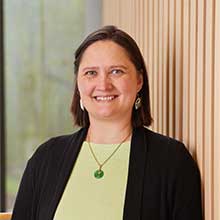Joanne Morris
PhD Student
Profile
Biography
Joanne began at SEI York in July 2012. She has experience in the field of water and soil fertility management in small-scale agriculture in semi-arid regions, working in sub-Saharan Africa. She has specifically been involved in developing scoping decision-support frameworks for technology up-take in agricultural water management and for rapid assessment of potential environmental impacts of livestock at landscape scale. She is also building experience in landscape-scale biomass management and interactions with soil fertility. Her focus is to build capacity in planning of sustainable agricultural development for future livelihood resilience and food security by involving stakeholders in developing representative models and scenario thinking for their contexts.
Joanne is currently undertaking research with SEI towards a PhD.
Career
- BSc & BSc(Hons) (Ecology and Environmental and Geographical Sciences, University of Cape Town)
- MSc (Environmental Studies and Sustainability Science, Lund University)
- 2012 to 2016: Research Associate, SEI-York.
Research
Overview
Since joining SEI she has worked in West, East and Southern Africa. She has been part of developing a Bayes belief network-based decision support tool (TAGMI) for mapping the likely suitability of agricultural water management technologies across countries or water basins, that incorporates social dimensions as well as biophysical. Since 2014, she has been working on rapid, landscape-scale assessment of water use by livestock value chains, as part of a framework that includes soil, greenhouse gases and biodiversity (CLEANED). Recently, she has investigated the processes by which organic matter affects soil nutrients and water holding capacity in semi-arid contexts. She is particularly interested in the interaction between biomass from agriculture for land management and domestic energy supply; and the opportunities to use new improved resolution remote sensing data and a range of mobile sensors including UAVs to improve data collection and availability in data scarce environments such as Africa for landscape level soil and water resource management.
Projects
Managing Water and Food Systems in the Volta and Niger basins (W4F) (Funder CGIAR WLE programme; £105k; August 2014 – December 2016) The project, Managing Water and Food Systems in the Volta and Niger basins (W4F) is Component 1 in the larger EC/IFAD funded WLE in Africa Project. The W4F project aims at adapting techniques for managing agricultural water at local and watershed levels including the interaction of surface and groundwater resources in parts of the Volta River basin. Some of the water resources are captured or linked to small water infrastructures which serve as integrative objects for better understanding of key processes that link people, nature and agriculture from different perspectives including governance and biophysical aspects. The project sets out to understand the social, economic, and biophysical complexities that are involved in the management of SR to better support livelihoods in rural communities.
Research activities are in five work packages:
- Innovation and learning on water management for food production within and between the Volta and Niger basins
- Improving understanding of the ecological resilience of small reservoirs in the Upper Volta River basin, including the analysis of the geographical diversity, water quality and anthropogenic pressures exerted on small reservoirs.
- Understanding livestock-crop-water interactions, water productivity, and market opportunities for selected value chains.
- Improving understanding of water governance, focusing on the implementation of Integrated Water Resources Management, the operationalization of a selected water committee, and the dynamics of water user associations in Burkina Faso
- Improving and upscaling of a decision-support tool (TAGMI) for targeting agricultural water management interventions.
SEI York staff: Steve Cinderby (PI); Joanne Morris, Jennie Barron, Mattieu Chaix-Bar and Pablo Ayala
Partners: International Water Management Institute (IWM)
Comprehensive Livestock Environmental Assessment for improved Nutrition, a secured Environment and sustainable Development along value chains programme. (CLEANED) (various funding) The overall vision of the programme is to contribute towards a pro-poor, environmentally responsible livestock sector investment and development, with specific reference to developing and emerging countries. Through pilot studies with smallholder dairy farmers in Tanzania and pig farmers in Uganda, the programme aims to show proof of concept of a new environmental assessment framework. This framework will provide data to support that current and proposed actions intended to improve incomes and food security in livestock systems are designed in such a way as to have a minimum environmental footprint while at the same time lifting people out of poverty. Current developments to the framework will be incorporating the environmental assessment tool in a social learning process that aims to encourage a more equitable decision-making space, and explore adding an economic analysis component to provide both economic and environmental data to inform the final decision making on the design of intended actions.
SEI York staff: Steve Cinderby (PI), Joanne Morris
Partners: International Livestock Research Institute (ILRI)
“Combining Approaches for Scaling-up UNEP’s Integrated National Policy Support” (COMBINE) (Funder UNEP; £xxk; January 2016 – March 2016) The aim of the project is to develop an integrated web resource with the relevant tools and guidance documents for the process of managing the transition to a green value chain including both Sustainable Consumption and Production (SCP) and Green Economy and Trade (GET) programmes. The project will assess UNEP’s activities related to the delivery of SCP and GET programmes in two countries (Chile and South Africa) in relationship to a conceptual roadmap to delivery, identifying complementarities, overlaps, conflicts and measures of success and develop recommendations for coherent policy advice in the same countries looking at changes to the current SCP and GET delivery process to make it more effective both on the producer and consumer side.
SEI York staff: Corrado Topi (PI), Jose Vega-Barbero, Joanne Morris
Partners: UNEP

